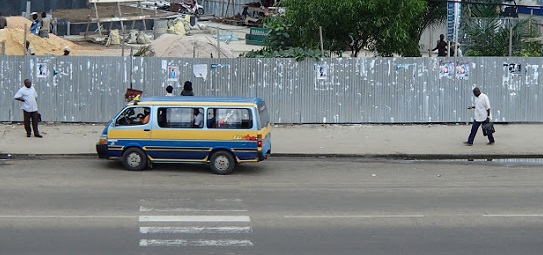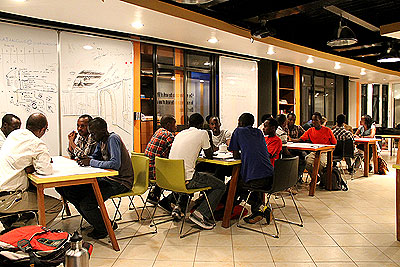My name is Emmanuel Leroueil. I am a strategy consultant based in Gabon and I have worked in other African countries too. A few years ago, I took part in the creation of Terangaweb – l’Afrique des Idées. Since I moved to Africa about a year and a half ago, I did not contribute to the website and the association as much as I would want to because I could not put my "ideas" into "action". It was easier for me to write and talk about Africa when I was not living there. Now that I am back, I am busy with many activities and I feel like I do not have enough energy to take part in the debate. This «Diary of a trainee entrepreneur» is an attempt to put my "ideas" into "action". I dedicate it to Réassi Ouabonzi, for his constant commitment.
My vision of entrepreneurship in Africa
Like many profesionals such as bankers, consultants and corporate lawyers, I have studied business plans of large, medium and small companies. With my work, I have observed that older companies have a sustainable economic performance but have difficulties to grow. Business creation is very important for the development of the economy of African countries.
Having an entrepreneurial mindset, I want to help meet the challenges faced by many countries on the continent such as the creation of jobs in a context of demographic explosion and the creation and redistribution of wealth. The creation of dynamic companies is a major concern. Here are some ideas I want to share with you to improve the current situation.
1) Focusing on simple businesses addressing people’s basic needs (production of vegetables, bakery, chicken farming, cooking, etc.) on existing markets, and on businesses where the production/sale cycle can be improved.
Investment in these sectors might seem logical. However, there are two main trends that I have observed.
The first and most common one is that small African investors systematically invest in usual small businesses without improving them. For instance, in the taxi business, everybody knows the price of a standard car to make a cab (between 2 and 3 millions CFA Francs for a second-hand car bought in Gabon). Everyone knows how the taxi-industry business model works. The taxi driver rents the car and pays a pre-determined amount of money. He keeps the remainder but if he does not earn enough money, he has to pay the amount regardless. This amount is known and the risks and profitability are quite low (around 75 000 CFA Francs per week in Gabon). In ten months, this investment becomes profitable while the market continues to absorb the increase of the offer. This example can be applied indefinitely, like the trend of telecenters (public payphones in the 1990s) or cybercafés, etc. Most real estate investments are similar to this model. These small businesses create extra wealth but do not really have any ripple effect on the rest of the economy. There is no increase in productivity.
A second trend that appeared more recently in Africa, is followed by the majority of start-up incubators. It gives priority to companies focusing on innovating or often non-existing segments: services linked to telecoms or Internet, sustainable energies or creation of high technology devices. Of course, some of these business models can succeed and are useful to both economy and society. However, they are riskier for investors since demand usually has to be created, flexibility has to be acquired for the product to meet with clients demands. Furthermore, economic and operational balance has to be reached in order to develop the company without using existing ideas… Undoubtedly, these start-ups have high failure rates.
In Africa, there is always loads of opportunities in simplest sectors where consumers demand already exists. We can bring some improvements and professionalise their organization because the competitors are often informal or under-productive. It is necessary to distinguish oneself from existing offers by implementing small innovations. There are multiple change levers: more efficient production tools, different distribution/sale channels that are closer to the customers, superior quality requirements and improved marketing of the products… These small innovations provide an added value to consumers and, eventually, to society. Nevertheless, the main interest of these businesses is to be able to make a quick scale change, and then to have an easily replicable model.
2) Choosing duplicable and suitable industrialization projects right from the start.
More concretely, it means that if you want to create a bakery, you should already start thinking about a "pilot project" to open a second, third, fourth store. And you have to take into account the failures and successes of the first project. This ambition is the best way to bypass the issue of access to funding that are decisive for African entrepreneurs (http://www.omidyar.com/insights/accelerating-entrepreneurship-africa-report). The ideal solution is to start the pilot project with your own funds. Thus, it is important to choose a business where the initial investment is not too high and where it is possible to progress gradually. The pilot project's income flows must then allow to partially fund the second investment wave (requiring businesses with short incomes cycles and positive cash flows). Above all, they have to allow the production of accounting data on the relevance of the project’s economic model, and activity history, which will help to attract investors (private equity) or convince bankers to give access to credit.
Of course, the duplication of the pilot project will not be easy since new issues can arise. How to store a bigger production? How to distribute a bigger production? How to replicate the model on new geographical markets? How to face embezzlement/malpractice with empowered teams and a weak creator/investor control? These difficulties are real and are part of the growth path for any actual and upcoming business in Africa. But they can be overcome.
Based on these ideas, I launched my own business creation project a month ago.
I plan to implement intensive greenhouse vegetable production around Kigali in Rwanda.
This Diary of a trainee entrepreneur is an opportunity for me to share this experience and the practical lessons I will learn with readers interested in business creation in African countries. The next post will provide details on the investment I made for this project, and will show how it will apply the ideas mentionned in this article.
Translated by Olivia Gandzion










Laisser uncommentaire
Votre adresse e-mail ne sera pas publiée. Les champs obligatoires sont indiqués par *